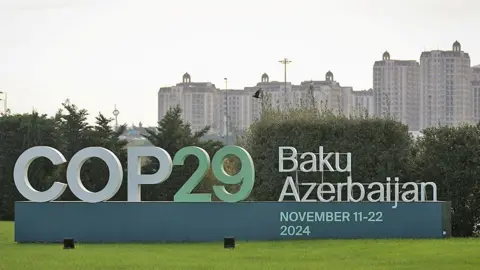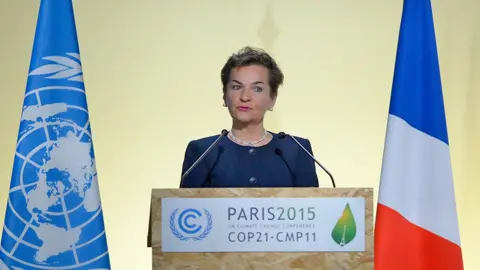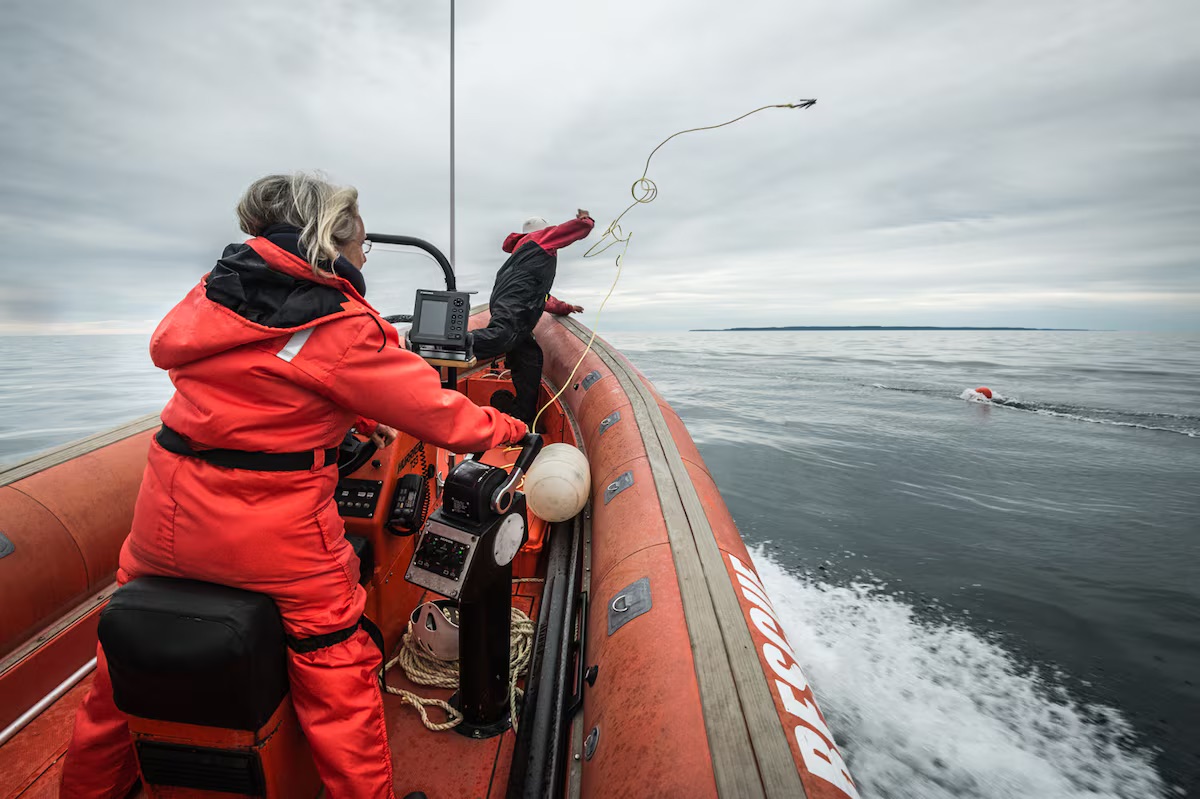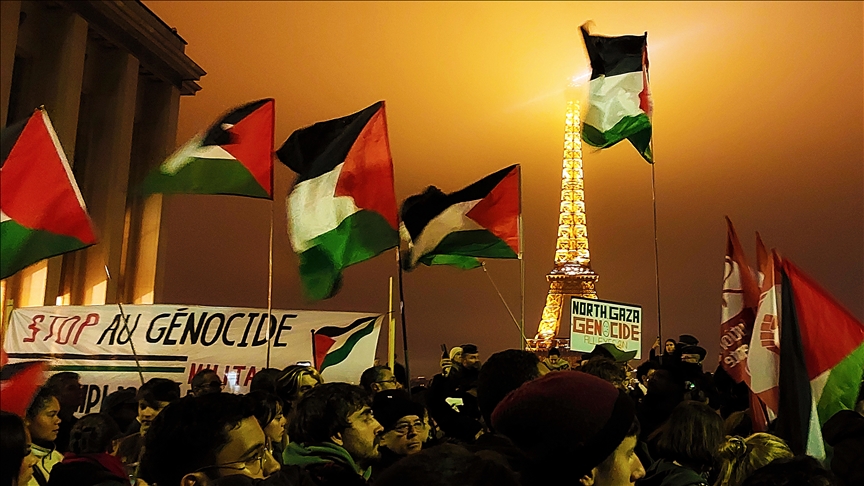Justin Rowlatt
BBC climate editor

Secret footage shows COP29's chief Elnur Soltanov discussing gas and oil deals
A senior official at COP29 climate change conference in Azerbaijan appears to have used his role to arrange a meeting to discuss potential fossil fuel deals, the BBC can report.
A secret recording shows the chief executive of Azerbaijan's COP29 team, Elnur Soltanov, discussing "investment opportunities" in the state oil and gas company with a man posing as a potential investor.
"We have a lot of gas fields that are to be developed," he says.
A former head of the UN body responsible for the climate talks told the BBC that Soltanov's actions were "completely unacceptable" and a "betrayal" of the COP process.

Baku is hosting this year's COP29 United Nations Climate Change Conference
As well as being the chief executive of COP29, Soltanov is also the deputy energy minister of Azerbaijan and is on the board of Socar.
Azerbaijan's COP29 team has not responded to a request for comment.
Oil and gas accounts for about half of Azerbaijan's total economy and more than 90% of its exports, according to US figures.
COP29 will open in Baku on Monday and is the 29th annual UN climate summit, where governments discuss how to limit and prepare for climate change, and raise global ambition to tackle the issue.
However, this is the second year in a row the BBC has revealed alleged wrongdoing by the host government.
The BBC has been shown documents and secret video recordings made by the human rights organisation, Global Witness.
It is understood that one of its representatives approached the COP29 team posing as the head of a fictitious Hong Kong investment firm specialising in energy.
He said this company was interested in sponsoring the COP29 summit but wanted to discuss investment opportunities in Azerbaijan's state energy firm, Socar, in return. An online meeting with Soltanov was arranged.

Azerbaijan has rich oil and natural gas deposits
During the meeting, Soltanov told the potential sponsor that the aim of the conference was "solving the climate crisis" and "transitioning away from hydrocarbons in a just, orderly and equitable manner".
Anyone, he said, including oil and gas companies, "could come with solutions" because Azerbaijan’s "doors are open".
However, he said he was open to discussions about deals too – including on oil and gas.
Initially, Soltanov suggested the potential sponsor might be interested in investing in some of the "green transitioning projects" Socar was involved in - but then spoke of opportunities related to Azerbaijan's plans to increase gas production, including new pipeline infrastructure.
"There are a lot of joint ventures that could be established," Soltanov says on the recording. "Socar is trading oil and gas all over the world, including in Asia."
Soltanov then described natural gas as a "transitional fuel", adding: "We will have a certain amount of oil and natural gas being produced, perhaps forever."
The UN climate science body, the Intergovernmental Panel on Climate Change, acknowledges there will be a role for some oil and gas up to 2050 and beyond. However, it has been very clear that "developing… new oil and gas fields is incompatible with limiting warming to 1.5C".
It also goes against the agreement the world made at the last global climate summit to transition away from fossil fuels.
Advertisement
A simple guide to climate change
Soltanov appeared eager to help get discussions going, telling the potential sponsor: "I would be happy to create a contact between your team and their team [Socar] so that they can start discussions."
A couple of weeks later the fake Hong Kong investment company received an email - Socar wanted to follow up on the lead.
Attempting to do business deals as part of the COP process appears to be a serious breach of the standards of conduct expected of a COP official.
These events are supposed to be about reducing the world's use of fossil fuels – the main driver of climate change – not selling more.
The standards are set by the UN body responsible for the climate negotiations, the United Nations Framework Convention on Climate Change (UNFCCC).
The UN said it could not comment directly on our findings but remarked that "the same rigorous standards" are applied to whoever hosts the conference, and that those standards reflect "the importance of impartiality on the part of all presiding officers".
Its code of conduct for COP officials states they are "expected to act without bias, prejudice, favouritism, caprice, self-interest, preference or deference, strictly based on sound, independent and fair judgement.
"They are also expected to ensure that personal views and convictions do not compromise or appear to compromise their role and functions as a UNFCCC officer."
Advertisement

Christiana Figueres, who presided over the historic Paris agreement, says doing deals on fossil fuels is a “betrayal” of the COP process
Christiana Figueres, who oversaw the signing of the 2015 Paris agreement to limit global temperature rises to well below 2C, told the BBC that she was shocked anyone in the COP process would use their position to strike oil and gas deals.
She said such behaviour was "contrary and egregious" to the the purpose of COP and "a treason" to the process.
The BBC has also seen emails between the COP29 team and the fake investors.
In one chain, the team discusses a $600,000 (£462,000) sponsorship deal with a fake company in return for the Socar introduction and involvement in an event about "sustainable oil and gas investing" during COP29.
Officials offered five passes with full access to the summit and drafted a contract which initially required the firm to make some commitments to sustainability. Then it pushed back, one requirement was dropped and "corrections" were considered to another.
The BBC asked Azerbaijan's COP29 team and Socar for comment. Neither responded to the requests.
The findings come a year after the BBC obtained leaked documents that revealed plans by the UAE to use its role as host of COP28 to strike oil and gas deals.
COP28 was the first time agreement was reached on the need to transition away from fossil fuels.










 Adeela Suleman's art installation Killing Fields of Karachi, which was displayed at the Frere Hall in Karachi on October 27, 2019, commemorated the 444 victims of alleged extrajudicial killings by policeman Rao Anwar: despite the uproar, Anwar continues to get acquitted in cases and remains a free man | Nazish Brohi
Adeela Suleman's art installation Killing Fields of Karachi, which was displayed at the Frere Hall in Karachi on October 27, 2019, commemorated the 444 victims of alleged extrajudicial killings by policeman Rao Anwar: despite the uproar, Anwar continues to get acquitted in cases and remains a free man | Nazish Brohi